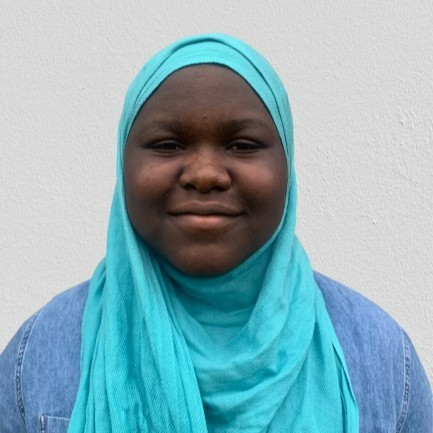
MARCH 7, 2022 — Rabiat Sadiq, a freshman pursuing a degree in computer engineering through the UTSA Department of Electrical and Computer Engineering (ECE), was recently awarded a $15,000 scholarship through the Apple Scholars program.
Sadiq credits the university’s near-peer mentor program, part of a newly implemented electrical and computer engineering initiative led by Henry Griffith, as key to her success.
The program improves the research skills of new ECE students by pairing them with advanced UTSA undergraduate students who have previously completed a computing research experience. The program also aids in the participants’ professional and personal development.
 Rabiat Sadiq
Rabiat SadiqNear-peer mentoring, which has enjoyed considerable success, is one of several initiatives implemented by ECE in fall 2021. The department overhauled its introductory class by leveraging a $24,500 award from Google’s exploreCSR program, which aims to enhance the participation of students from historically marginalized backgrounds in research computing pathways. Led by Griffith, a lecturer in the UTSA Margie and Bill Klesse College of Engineering and Integrated Design’s (Klesse College) ECE department, the exploreCSR program utilizes a variety of approaches to promote participation in research by enhancing students’ self-efficacy, awareness of resources and technical skills.
“Entering college, I did not plan to be involved in research,” Sadiq said. “The near-peer mentorship exposed me to research and other areas of professional development. The mentorship program played a critical role in me receiving the recent Apple award.”
Sadiq’s partner was Ashley Larweck, a senior biomedical engineering major. Larweck, who is currently an intern with the U.S. Air Force Research Laboratory, shared information about her research experiences and stressed the importance of pursuing internship opportunities.
“This opportunity to directly mentor Rabiat and speak to early-stage engineering students has been an invaluable experience that I’m so grateful for,” Larweck said. “I’m so incredibly proud of Rabiat’s growth throughout the mentorship and it’s my hope that the same success will continue through her career.”
While existing interventions focused on developing pathways for historically marginalized students have existed for some time, many of those programs are tailored to advanced undergraduate students or are offered in an extracurricular format. UTSA researchers—including Griffith and co-investigators CJ Qian, the ECE department’s Mary Lou Clarke Endowed Professor and chair, and Heena Rathore, an assistant professor of instruction in the UTSA Department of Computer Science—are addressing this limitation by incorporating interventions at the entry level, in the Introduction to ECE course, to improve access to computing research career pathways.
“Students from historically marginalized backgrounds often face unique socioeconomic challenges that limit their ability to participate in extracurricular activities such as graduate school workshops or coding boot camps. These students often have limited exposure to individuals working within computing research,” Griffith said. “By integrating novel programming targeted to enhance students’ familiarity with relevant technical skills within an introductory engineering course, we’re attempting to address these challenges and accelerate students’ access to opportunities within computing research, including internships and undergraduate research experiences.”
Programs include the introduction of emerging technologies and practices in computing research, a guest speaker series to make students aware of professional pathways available in their chosen field and active-learning pilot projects that provide students with the opportunity to assemble a smart voice assistant using the Google Artificial Intelligence Yourself (AIY) voice kit.
“Klesse College has a strong track-record of promoting the success of students from historically marginalized backgrounds,” Griffith said. “Google’s commitment includes a variety of programs intended to promote participation in research that will allow us to expand and accelerate access to these programs while building students’ awareness of and preparation for the workforce.”
Throughout this spring semester, Klesse College will deploy new programs thanks to expanded support from the UTSA Teaching and Learning Reimagined program and Klesse College’s Incorporating In-Demand Technical and Professional Skills program. One new project will provide hands-on opportunities for students to work with Google’s TensorFlow technologies—an open-source machine learning and artificial intelligence software library.
“The efforts supported by the exploreCSR program represent our ongoing commitment to continuously improving the educational experience for our students,” Qian said.
The faculty team hopes to continually expand early student exposure to industry and research opportunities and to further enhance participation rates for historically underrepresented groups through additional extracurriculars and additional course integrations.
“Enhancing diversity within computing research pathways at the undergraduate level is essential for ensuring representation in the future workforce,” Griffith said. “We are grateful to Google Research for its support of our efforts to help promote the participation of historically marginalized individuals within computing research.”
UTSA Today is produced by University Communications and Marketing, the official news source of The University of Texas at San Antonio. Send your feedback to news@utsa.edu. Keep up-to-date on UTSA news by visiting UTSA Today. Connect with UTSA online at Facebook, Twitter, Youtube and Instagram.
Move In To COLFA is strongly recommended for new students in COLFA. It gives you the chance to learn about the Student Success Center, campus resources and meet new friends!
Academic Classroom: Lecture Hall (MH 2.01.10,) McKinney Humanities BldgWe invite you to join us for Birds Up! Downtown, an exciting welcome back event designed to connect students with the different departments at the Downtown Campus. Students will have the opportunity to learn about some of the departments on campus, gain access to different resources, and collect some giveaways!
Bill Miller PlazaCome and celebrate this year's homecoming at the Downtown Campus with food, games, giveaways, music, and more. We look forward to seeing your Roadrunner Spirit!
Bill Miller PlazaThe University of Texas at San Antonio is dedicated to the advancement of knowledge through research and discovery, teaching and learning, community engagement and public service. As an institution of access and excellence, UTSA embraces multicultural traditions and serves as a center for intellectual and creative resources as well as a catalyst for socioeconomic development and the commercialization of intellectual property - for Texas, the nation and the world.
To be a premier public research university, providing access to educational excellence and preparing citizen leaders for the global environment.
We encourage an environment of dialogue and discovery, where integrity, excellence, respect, collaboration and innovation are fostered.